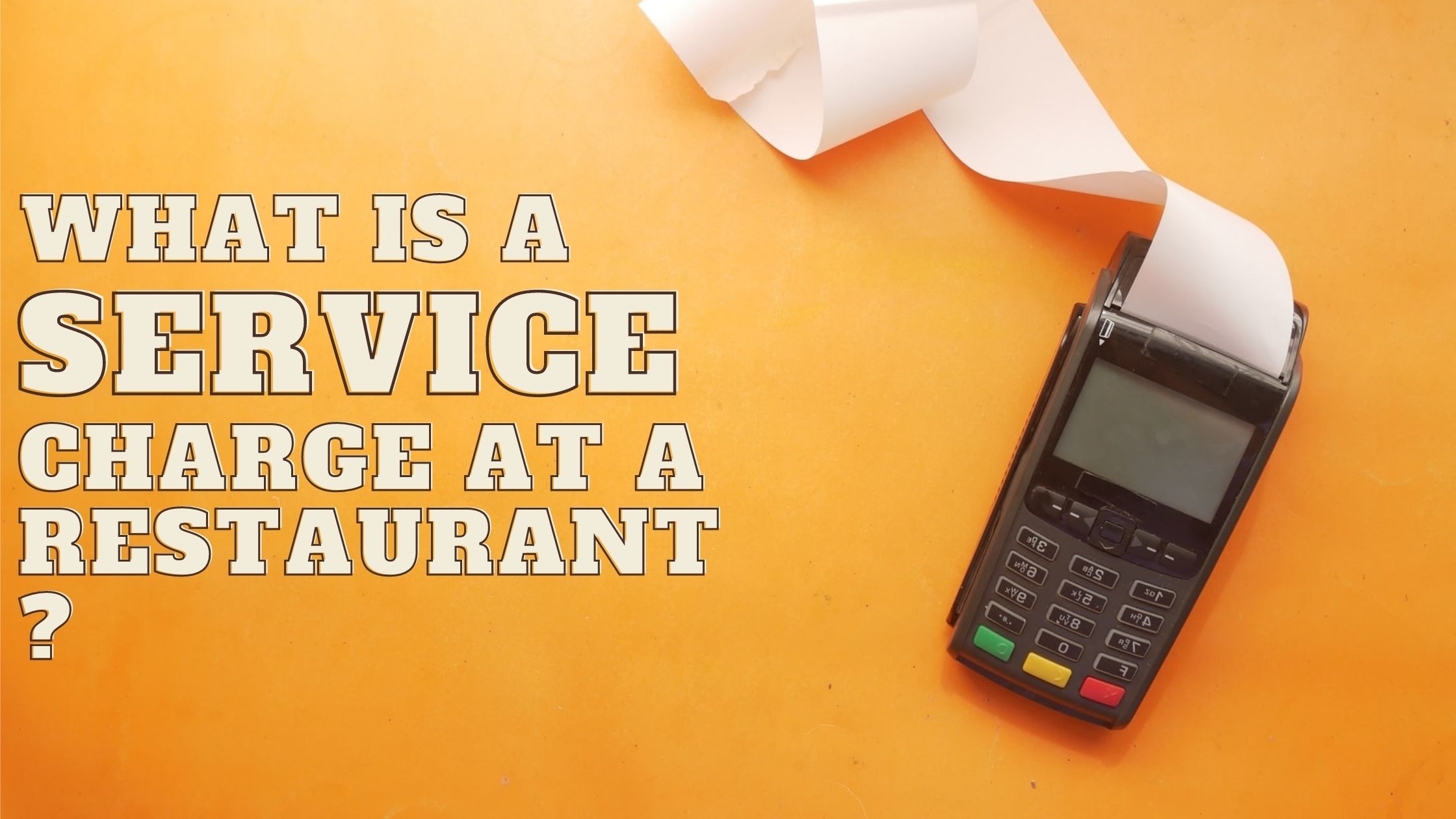What is the service fee at a restaurant? And, what is the difference between service charge vs gratuity?
Continue reading to have answers to these, and any other questions that you may have about service charges at restaurants.
What Is A Service Charge (In General)?
Whenever you are at a place of business that is providing you with some form or type of service, they can charge you for that service. This is called the service charge. A service charge can be levied by a lot of places operating in the service sector.
A restaurant is not the only place that will levy a service charge on your food bill. Service charges are also commonplace at banks, hotels, travel, and more.
These service charges are added to your final bill by the restaurant or the company. In this article, we will be primarily focusing on service charges at restaurants.
What Is A Service Charge At A Restaurant?

Credit: Photo by Artem Beliaikin on Unsplash
A service charge at a restaurant is the extra amount charged, in addition to your total food bill, for the services the restaurant provides. The usual service charge at a restaurant could be anywhere between 10% to 20% of the food bill, sometimes more.
A restaurant is a type of business that comes under the service sector. They provide you with food as a service and for this service, they may charge you extra money, on top of the price you are paying for the food.
Service charges levied on your final food bill are often added after calculating the total bill. The service fee is not included in the menu price of the food items but instead is added as a percentage of your total food bill.
Every customer’s check is subject to a certain percentage of the service charge if a restaurant charges a service charge.
The complete amount of the service charge belongs to the restaurant and it can be used to help cover employee wages, meet minimum wage requirements or provide other employee benefits.
If you are wondering how much service fee a restaurant charges, then you need to look no further than the menu. You can find, hidden away in the corner or at the bottom, a small print that indicates the percentage of service charge if any.
Who Does The Service Charge At A Restaurant Go To?
Traditionally, a service charge or a service fee is meant for the servers or waiters that serve you your food, along with the kitchen staff. The company or restaurant can distribute all or a portion of the service fee that they collect amongst their servers.
Since the service charge is a part of your final bill, it goes directly to the restaurant first. And the restaurant is not legally obliged to share this service charge with its employees.
It is common for many restaurants to only share 60 to 70% of the service fee with their servers, while there are more than a handful of restaurants that do not share it at all.
This is why it is important to understand that a service charge and gratuity are not the same.
It isn’t uncommon for people to confuse the two, but they have different implications, which we will further discuss in the article.
Is It Legal For Restaurants To Charge A Service Fee?
Yes, it is legal for restaurants to charge a service fee. However, the legality is also subject to the federal government, the state government, as well as the local government of the part of the country you are dining in. Different governments have different rules on restaurant service charges.
For example, in California, as per this Davis Wright article, service charges, or any additional charge added to the food bill are allowed and can be treated as gratuity. This means that the restaurants can use this to pay for overtime wages or bonuses.
Another important thing to note is that in many states, service charges aren’t mandatory. What this means is that you can ask your server to remove the service charge from your check and they are obliged to do so.
Is A Service Charge The Same As Gratuity?

Credit: Photo by Sam Dan Truong on Unsplash
A service charge is not the same as gratuity if the charge is levied on the food bill mandatorily and must be paid by the customer. However, a service charge can be considered a gratuity at a restaurant if the charge is not mandatory.
While the restaurants are allowed to distribute the earnings from a service fee between the employees, they are not the same thing, in their very essence.
A gratuity is more of a tip or something that is given by the customer to the server, off of his or her own violation. This can be in the form of money – both cash or digital transactions.
A gratuity can also be in the form of a git or a kind gesture.
Read More: Gratuity Vs. Tip At A Restaurant – What’s The Difference?
A service fee, on the other hand, is strictly monetary and added by the restaurant to the bill, instead of being given by the customers as per their own liking.
Another thing that really differentiates gratuity from the service charge is who the money actually goes to.
The gratuity or tips handed out by a customer directly goes to the server. This can then be used by the server or it can be put into a tip pool.
A tip pool is nothing but a “pool” or collection of all the tips that the employees have received.
This pooled amount is later divided and distributed among all the non-managerial employees.
On the other hand, a restaurant service charge, which is added to your check goes directly to the restaurant and it is up to them to use this however they see fit.
When Is A Service Charge Considered Gratuity?
A service charge can be considered a gratuity when the restaurant does not make it customary to pay the service charge. If the service charge is optional, you can consider it to be a gratuity, if it really goes towards the servers.
When Is A Service Charge Not Considered Gratuity?
A service fee at a restaurant is not considered a gratuity if it is mandatory for the customer to pay the service charge regardless of how they feel about the service. A customer can choose to add a gratuity on top of the service charge.
This is one major difference between service charge and gratuity which distinguishes one from the other.
Why Do Restaurants Charge Service Charge?
Restaurants often charge a service fee or service charge to pay the minimum hourly wage to an employee (mostly a server) who hasn’t been tipped enough to meet the minimum federal wage. Baking a service charge into the food bill prevents instances of servers not getting minimum wages.
To better understand what restaurants do with the service charges and why restaurants charge a service charge in the first place, we need to take a quick look at how waiters are compensated at restaurants.
Generally speaking, there are two types of wages that a waiter or server can get. One is tipped wages, where, if the server is allowed to take tips, and can receive at least $30 in tips per week, then their minimum wage is $2.13 per hour.
Hence, the total wage of a server who receives a tipped wage is calculated by combining the base minimum hourly wage, and the tips they received.
Alternatively, if an employee or server is not getting tipped, or the tipped wages are lower than $7.25 per hour, then the restaurant is responsible for ensuring that they get the minimum wage.
$7.25 is the current federal minimum wage, however, this differs drastically from state to state.
You can find information regarding minimum wages in different states in the table below:
| State | Minimum Hourly Tipped Wage |
| Alabama | $2.13 |
| Alaska | $10.34 |
| Arizona | $9.80 |
| Arkansas | $2.63 |
| California | $15 |
| Colorado | $9.54 |
| Connecticut | $13 |
| Delaware | $2.23 |
| District of Columbia | $5.05 |
| Florida | $6.98 |
| Georgia | $2.13 |
| Hawaii | $9.35 |
| Idaho | $3.35 |
| Illinois | $7.20 |
| Indiana | $2.13 |
| Iowa | $4.35 |
| Kansas | $2.13 |
| Kentucky | $2.13 |
| Louisiana | $4.35 |
| Maine | $6.38 |
| Massatucutes | $6.15 |
| Maryland | $3.63 |
| Michigan | $3.75 |
| Minnesota | $10.33 |
| Mississippi | $2.13 |
| Missouri | $5.58 |
| Montana | $9.20 |
| Nebraska | $2.13 |
| Nevada | $9.75 |
| New Hampshire | $3.26 |
| New Jersey | $5.13 |
| New Mexico | $2.80 |
| New York | $13.20 |
| North Carolina | $2.13 |
| North Dakota | $4.86 |
| Ohio | $4.65 |
| Oklahoma | $2.13 |
| Oregon | $12.75 or $14 |
| Pennsylvania | $2.83 |
| Rhode Island | $3.39 |
| South Carolina | $2.13 |
| South Dakota | $4.975 |
| Tennessee | $2.13 |
| Texas | $2.13 |
| Utah | $2.13 |
| Vermont | $6.28 |
| Virginia | $2.13 |
| Washington | $14.46 |
| West Virginia | $2.62 |
| Wisconsin | $2.33 |
| Wyoming | $2.13 |
| Puerto Rico | $2.13 |
| US Virgin Islands | $4.20 |
The above mentioned are the basic minimum hourly wages for servers in each state. When these hourly incomes are combined with the tips or the gratuity, the total should be equal to the state minimum wages.
If the employee or the server is unable to make the state-mandated minimum wage, it falls on the shoulders of the restaurant to provide them with this wage.
This is where service charges can come in handy.
Restaurants can use the service charge to pay for the hourly wages for employees who are on tipped wages and do not meet the minimum wages.
This can especially be great for people in states with low minimum wages.
How Much Service Charge Do Restaurants Charge?

Credit: Photo by Artem Beliaikin on Unsplash
Most often, the service charge levied at a restaurant in the U.S. is an average of 20% on the food bill. The amount that you pay as a service charge varies greatly based on where you are, the type of establishment, restaurant policies, etc.
With service charges at restaurants, you can expect an average rate of 20% on your bill. Thus, if your food bill is $100, then after adding the 20% service charge, the final bill will come out to $120 total.
Similarly, when it comes to gratuity and tips, a tip of 15% of your total bill is considered to be the absolute minimum and the average amount ranges between the 15% to 20% range.
This means that if the total cost of your meal was $100, then you will be paying a $15 tip (at a 15% rate).
Generally, you can find out how much service charge a restaurant is charging by either asking your server or checking your menu.
You can find information regarding the percentage of the service charges on the menu itself.
Another thing to note is that there are also quite a few restaurants where you won’t have any service charge whatsoever.
Some of them also won’t accept tips. This is because the additional charges are baked into their menu.
At such restaurants, the prices listed on the menu for the different food items, include service charges. This is why some of these restaurants are quite expensive.
This is also the trick used by many fast-food and drive-thru-only places. As these places have limited time or they have fairly high footfall, it is more efficient for them to include charges in their menu prices.
This is why they don’t have any external service charge.
Is A Restaurant Service Charge Compulsory?
If the state you’re dining in doesn’t mandate service charges, then it is not compulsory for the customer to pay the service charge. In these states, you can ask your server to remove the service charge from your bill. Otherwise, the service charges at a restaurant are compulsory.
If you are at a place that has a service charge, it might feel like you compulsorily have to pay the service charge even if you weren’t a fan of the service. This brings us to the frequently asked question “Is it okay if I don’t pay the service charge at a restaurant”?
So, the next time you step out to enjoy a good meal at your local restaurant, don’t forget to ask your server about your rights.
On the other hand, gratuity is paid off of your own violation and it can be as big or small as you want. If the service was okay it is normal for people to tip 20%. But if the service was subpar or particularly bad, you can choose to pay a less percentage or not pay at all.
Controversies Regarding Service Charge At Restaurants
The concept of service charges at restaurants has been the subject of countless debates and discussions over the years. Many people including the servers believe that a service charge isn’t the ideal solution.
Oftentimes, when a customer is paying a service charge they believe that it is directly going towards the service staff. This may lead them to not give any additional tips, which is more than fair on their part as they shouldn’t have to pay for the service twice.
But a lot of establishments only pay out a small portion of the service charge to the employees. What this essentially means is that in situations like this, service charges can have a direct negative impact on the wages of the servers.
This is why having transparency is important. Restaurants need to mention that there will be a service charge levied on the food that you are about to order, prior to your actually making the order.
What this does is, it lets the customer decide whether they would like to pay the service charger or if they would like to forgo the service charge and pay their server directly in the form of tips, that are directly handed out to the server.
Final Words
So to sum it all up, a service charge is more or less an additional 20% percent of your total food bill, which is added to your final bill by the restaurant for the services they provide. A service charge is not the same as a tip or gratuity.
You have the right to not pay the service charge (if the state does not mandate the payment of the service charge). You can ask your server to remove it from your bill if you wish to directly tip your server instead.
Service charges can be used by restaurants to pay a bonus or the required minimum wages to their servers.
The next time you are at a restaurant, don’t forget to check the menu or ask your waiter about the restaurant’s service charge and gratuity policy.







